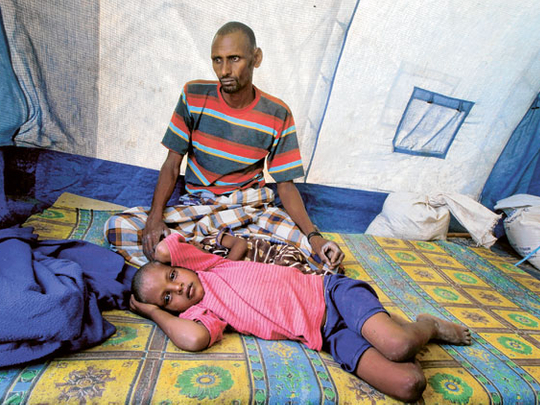
Dadaab, Kenya: First Aden Ali Mohammad's 25-year-old wife died just days after giving birth to twins. Then his newborn son succumbed to malnutrition. His baby girl did not survive either, leaving the Somali man to now raise his surviving children alone in a refugee camp.
Mohammad says it's been difficult to find work when he must always look after four-year-old Ebrahim and two-year-old Sharmarke, who do not even know yet that their mother is dead.
"Taking care of children, like a mother, is very hard," Mohammad said as the little boys slept on a thin mattress nearby.
"If people bring me uncooked food, I don't know how to cook it. Most of the time, neighbours prepare breakfast or lunch for my children hours after they're done with theirs. When I'm alone with my children, tears flow freely."
Mohammad broke down several times as he spoke to The Associated Press about his plight, especially when talking of the pain of raising children alone without support from relatives. Somalia is a predominantly Muslim, deeply conservative country where women bear the primary responsibility for tending to children.
Mohammad and his nine-month pregnant wife were among the tens of thousands of Somalis who already have fled starvation amid the country's worst famine in 60 years.
More than 12 million people in the Horn of Africa region need food aid, according to the United Nations. But the situation has become far more grave in Somalia because Al Qaida-linked militants have banned many aid organisations from distributing food in the areas under their control. Members of Al Shabab have even killed people trying to flee southern Somalia, saying it is better to starve than accept help from the West.
Many Somalis, such as Mohammad and his family, make the harrowing journey to neighbouring Kenya on foot. He carried one of his sons while his pregnant wife carried another on their 19-day journey.
"We didn't eat anything else other than what strangers give us," he said. "We normally started the journey early in the morning and walked for about five hours. We rested a bit and in the early evening we resumed our journey."
But their hopes for a better life in Kenya were short-lived, and now Mohammad says he's struggling to raise his young sons far from the support network of his extended family.
"I believe in God, but when I recall what happened to me I feel my heart was ripped out," he says. "I sometimes pray and ask God to give me power to withstand this nightmare. I haven't felt happiness since I came here, only my sadness has increased."
Mohammad has five other children and a second wife who stayed behind in Somalia with relatives, but despite his loneliness and pain he doesn't plan to go back anytime soon.












